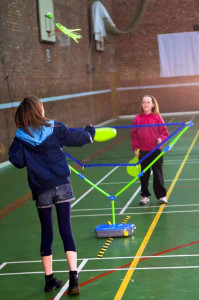More than a quarter of children in Birmingham don’t play ANY sport outside of school, with parents found guilty of setting a bad example, according to new research.
 The findings emerged in a study by Mookie Toys, the makers of Tailball, which polled 2,000 parents of children aged five to eleven, and showed that 29 per cent are participating in just two hours of curriculum led physical education each week.
The findings emerged in a study by Mookie Toys, the makers of Tailball, which polled 2,000 parents of children aged five to eleven, and showed that 29 per cent are participating in just two hours of curriculum led physical education each week.
This means kids are doing just 28 per cent of their recommended exercise – with government guidelines suggesting they should do a minimum of one hour every day.
Instead, the study shows 45 per cent of children in Birmingham would rather park themselves in front of the television, and 32 per cent would rather play computer games. A further 28 per cent want to play with their friends more than playing sport.
Guy Orr, head of product development at Mookie Toys, the makers of Tailball, explains: “These findings are particularly shocking because while over two thirds of children are participating in sports outside of school, this still means millions aren’t.
“The implications on their future health are huge – they won’t be learning the importance of keeping fit and active.
“It really is up to the parents to do anything they can to get their children active. Even just playing a bat and ball game, such as Tailball, in the garden or park can really help to develop a child’s sporting confidence and abilities.”
But the poll shows parents aren’t setting a good example to their children as they don’t do enough exercise either – with the average respondent participating in a sports activity just twice a week.
Two thirds of parents in Birmingham admit their children would probably be more interested in sport if they were to play with them – even in the garden.
But the average family in Birmingham plays sports games together – such as bat and ball, football or rounders – just two or three times a month.
And two in five Birmingham parents admit they probably played much more sport when they were young than their own children ever have.
Guy continues: “Playing sporting games as a family can really help to encourage a child’s interest and confidence in sport. Our research highlighted that a third of parents believed their children to be uninterested in sport, whilst one in six also admitted to having no clue as to whether their child showed any talent at a particular sport. It is therefore incredibly important that parents try to stimulate their child’s interest in keeping active to ensure they adopt a healthy lifestyle as they get older.
“However, most importantly, sport should be made to be fun – children will want to get involved more if their parents are doing it with them. And this doesn’t mean that parents will need to create a punishing fitness regime for the family, by just incorporating a few family activities into your daily lifestyle, such as playing a bat and ball game in the garden or on holiday, can really help to get children enthusiastic about sport.
”In fact, we also recently undertook an in-depth study with the Faculty of Health at Staffordshire University which revealed that playing Tailball for just a few days can really help to increase a child’s confidence in their playing ability and improve coordination.”
But half of parents polled claim they DO actively encourage their children to participate in sports regularly.
Indeed, many parents are resorting to bribery to get their offspring up and out of the house.
And the most popular enticement used by 26 per cent of parents is the promise of exercising with their children.
Other commonly used bribes include offering television time, or use of the computer games console.
19 per cent of parents also offer to have friends round on another day if their children give in to a game of football or bat and ball.


